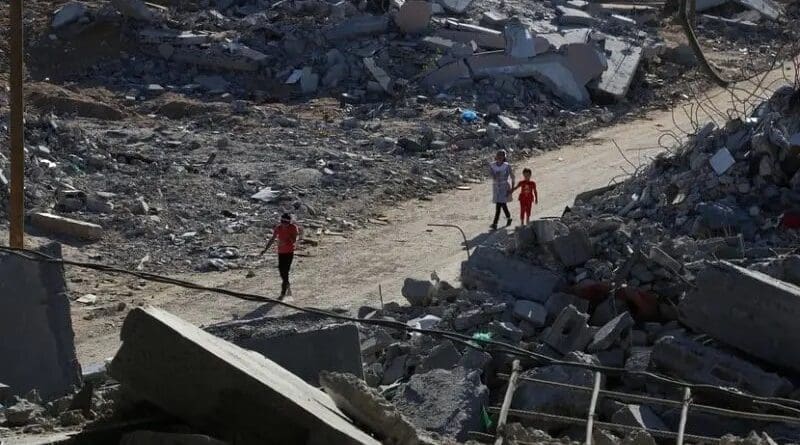Palestinians Remain United In Their Politics And National Priorities – OpEd
By Ramzy Baroud
Seventy-five years have passed since the ethnic cleansing of Palestine, an event carved into the collective Palestinian memory and known as the Nakba, or catastrophe.
As nearly two-thirds of the total population of Palestine at the time — between 1947 and 1949 — were made into refugees, dispersed throughout many countries and regions, the sense of Palestinian nationhood was, like Palestine itself, under attack.
The seven-and-a-half decades since then have made matters even worse. Aside from the millions of Palestinians living in the diaspora and the 2 million-plus Palestinians who remained in historic Palestine, now Israel, the Palestinians in the Occupied Territories are also politically decentralized.
The division of Palestinians in the Occupied Territories was not exactly done by choice. Soon after the Oslo Accords, which were signed between Israel and the Palestine Liberation Organization in 1993, the West Bank was segmented into three main regions, each administered differently, but all remaining under Israeli military occupation.
Moreover, the status of East Jerusalem has been determined entirely according to Israeli whims; contrary, of course, to international law. The UN still recognizes East Jerusalem as an occupied Palestinian city, like the rest of the Palestinian territories, including besieged Gaza.
Yet, despite all of this, the sense of Palestinian unity remains intact. Palestinians everywhere, including in all the segregated regions of Palestine itself, still see themselves as one. This is one of the most important achievements of Palestinian cultural resistance throughout the years.
Survey after survey continues to demonstrate the collective Palestinian sentiment, their trust in one another and their lack of trust of Israel and its benefactors. There are also disagreements, not necessarily motivated by regional priorities, but likely by class or political orientation.
A new YouGov-Arab News survey looked at a sample of 953 Palestinians living in the Occupied Territories. Some of the conclusions of the survey were consistent with the results of similar polls, although others diverged somewhat from accepted maxims. This could be, in part, due to certain limitations pertaining to the various surveys or to the nature of the questions asked.
Expectedly, the majority of Palestinians rejected any political alternative that may be offered should Israel refuse to return East Jerusalem to its rightful owner. In 1980, the Israeli government illegally annexed Jerusalem to be part of Israel — a decision that has been rejected by the UN many times since.
In the early 2000s, Israel unleashed its so-called Jerusalem Master Plan 2000 to ensure Israeli Jews gained total demographic superiority over Palestinian Arabs in the city. This entailed the expansion of Jerusalem’s boundaries, the exclusion of Palestinian neighborhoods from the municipality’s new borders and a slow but constant process of ethnically cleansing Palestinians. None of this seems to have changed the fundamental nature of the relationship between Palestinians — now a minority in their historic city — and Jerusalem, as conveyed by this survey and others.
Consistency can also be observed by the fact that the majority of Palestinians (82 percent) believe that Washington has most influence over Israel while, at the same time, a majority continue to have no trust in the US as a fair mediator. Instead, a whopping majority (80 percent) believes that China, not the US, is a potential mediator and a fair peace broker.
Palestinian views toward China have rarely been the focus of previous surveys, but the changing global geopolitics and China’s leading role in brokering an agreement in April between Saudi Arabia and Iran has contributed to the rising credibility of Beijing in the eyes of most Palestinians — in fact, likely of people across the whole region.
This creates a dichotomy. The fact that the majority of Palestinians do not trust “any Israeli government” to reach a peace agreement and also have no trust in the Palestinian Authority, while the majority have faith in Chinese mediation, raises more questions than answers.
In addition, expectedly, the majority of Palestinians (64 percent) reject outright the so-called Abraham Accords. Also, a majority (52 percent) believe that normalization has empowered Israel to be more aggressive. The latest Israeli war on Gaza, which began last Tuesday, is testimony to the latter finding.
The survey’s conclusion of the Palestinian view of the two-state solution is particularly interesting, and somewhat inconsistent with recent opinion polls on the matter. The YouGov survey says 51 percent of Palestinians still have faith in the two-state solution. But is this actually the case?
An October 2021 survey conducted by the Jerusalem Media and Communication Center in East Jerusalem revealed that support among Palestinians for a two-state solution had dropped significantly, from 39 percent to 29 percent. Meanwhile, support for a one-state solution had jumped to 26 percent, from 21 percent a few months earlier.
Why would that trend be reversed now, considering Israel’s growing investment in illegal settlement construction, the lack of any US pressure on Israel and the near-complete absence of any discussion, let alone negotiations, toward a two-state solution?
Despite the few inconsistencies, which require larger and more focused polls, Palestinians remain united in their own priorities as a people — their lack of faith in Israel, its benefactors, normalization and, unsurprisingly, their own leadership as well.

